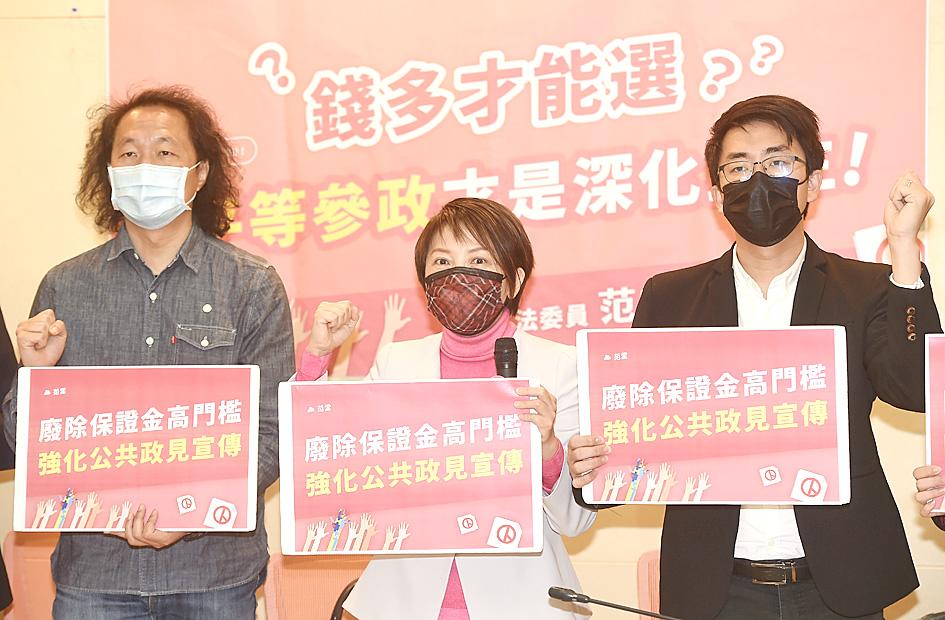Democratic Progressive Party (DPP) Legislator Fan Yun (范雲) and political reform advocates yesterday called for a reduction of the deposit required from people who want to run for public office, saying the current rules have turned the nation’s elections into “a game for the rich,” while marginalizing most people from participatory democracy.
“The system should be open for ordinary citizens to run for public office. It should not have thresholds to rule out people based on wealth and assets,” Fan told a news conference in Taipei.
“That was why I refused to put up the NT$2 million [US$70,582 at the current exchange rate] as a deposit when entering the race for the Taipei mayoral election in 2018,” Fan said.

Photo: Chien Jung-fong, Taipei Times
She filed a lawsuit seeking a constitutional interpretation on the deposit requirement after the Central Election Commission disqualified her for failing to deposit the money and did not allow her to register as a candidate.
“The deposit requirement is unconstitutional, as people are denied equal rights to participate in elections and hold public office,” she said, vowing to appeal a Taipei High Administrative Court ruling against her.
The deposit must be reduced to “reasonable levels,” she said.
It is unfair to ask young people or ordinary people to deposit NT$200,000 to register in city and county councilor elections, and NT$50,000 for local borough warden office elections, she added.
Furthermore, a candidate forfeits their deposit if they cannot obtain the votes of at least 10 percent of all eligible voters in an electoral district, Fan said.
“No deposit money is required in France and many US states, where candidates can run for office based on signature drives, or there are very low deposit amounts. Canada, Germany, Ireland and other countries used to require deposits, but they changed their requirements after it was ruled unconstitutional,” she said.
Taiwan Democracy Watch director Chang Feng-yi (張烽益) said that requiring high deposits excludes poor people from running for public office.
In this way, the political system becomes “big money politics” and “turns elections into a game for the rich, excluding most people from our participatory democracy,” Chang said.
Green Party Taiwan convener Liu Chung-hsien (劉崇顯) said that other reforms are needed as well.
The threshold for political parties to receive government subsidies has been set at 3 percent of the number of votes cast in the latest legislative election, which is too high and should be lowered to 1 percent, Liu said.
“This would better conform with the vision for Taiwan’s multiparty diversity in the political landscape, and promote the development of our democratic society,” Liu added.

OPTIMISTIC: The DGBAS sharply upgraded its GDP growth estimate from 3.54 percent to 7.71 percent after the Taiwan-US trade agreement signing and given AI optimism The US imported more from Taiwan than China for the first time in decades, as US President Donald Trump’s tariffs reshape trade flows while a global boom in artificial intelligence (AI) fuels demand for tech products. US purchases of goods from China plunged almost 44 percent in December last year from 2024 to US$21.1 billion, US Department of Commerce data showed on Thursday. By contrast, shipments from Taiwan more than doubled during the same period to US$24.7 billion. The soaring Taiwanese shipments to the US reflect the huge expansion in supplies of chips and servers for AI companies, which has completely changed

NON-NEGOTIABLE: The US president’s action ran counter to one of the US’ ‘six assurances’ on not consulting China about arms sales to Taiwan, US lawmakers said US President Donald Trump’s admission that he is discussing arms sales to Taiwan with Chinese President Xi Jinping (習近平) is “alarming and a blatant violation of US policy and the six assurances,” US Representative Ro Khanna said on Tuesday. Trump on Monday said he would decide soon on whether to send more weapons to Taiwan, after Xi warned him not to do so. “I’m talking to him about it. We had a good conversation, and we’ll make a determination pretty soon,” Trump told reporters aboard Air Force One when asked about warnings raised by Beijing during a phone call with Xi over

The Central Election Commission has amended election and recall regulations to require elected office candidates to provide proof that they have no Chinese citizenship, a Cabinet report said. The commission on Oct. 29 last year revised the Measures for the Permission of Family-based Residence, Long-term Residence and Settlement of People from the Mainland Area in the Taiwan Area (大陸地區人民在台灣地區依親居留長期居留或定居許可辦法), the Executive Yuan said in a report it submitted to the legislature for review. The revision requires Chinese citizens applying for permanent residency to submit notarial documents showing that they have lost their Chinese household record and have renounced — or have never

US and Chinese fighter jets briefly faced off above waters near the Korean Peninsula this week, Yonhap News agency reported, marking a rare confrontation in that area between the two superpowers. About 10 US fighter jets on Wednesday departed an airbase in Pyeongtaek, South Korea, for drills above international waters off South Korea’s western coast, the news outlet cited unidentified military sources as saying. While the US planes did not enter China’s air defense identification zone, Beijing scrambled planes as they neared that region, the report said. “The Chinese People’s Liberation Army organized naval and air forces to monitor and effectively respond